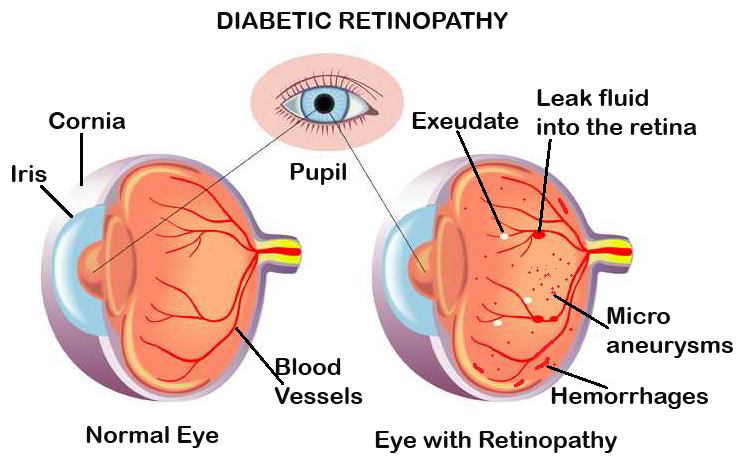Diabetic Retinopathy Treatment
Diabetic Retinopathy is a serious eye condition caused by damage to the blood vessels in the retina due to diabetes. It is the leading cause of vision loss in people with diabetes and one of the most common causes of blindness in adults worldwide. At Hashemi Eye Care, we provide comprehensive care for diabetic retinopathy, from early diagnosis to advanced treatment options, to help preserve and protect your vision.
What Is Diabetic Retinopathy?
Diabetic Retinopathy occurs when high blood sugar levels damage the tiny blood vessels in the retina, the light-sensitive tissue at the back of the eye. Over time, this damage can lead to fluid leakage, swelling, and the formation of abnormal blood vessels, which can impair vision and, if left untreated, result in blindness.
There are two main stages of diabetic retinopathy:
Non-Proliferative Diabetic Retinopathy (NPDR): The early stage, where blood vessels leak or become blocked, causing retinal swelling and vision impairment.
Proliferative Diabetic Retinopathy (PDR): The more advanced stage, where new, abnormal blood vessels grow on the surface of the retina, leading to more severe vision problems and an increased risk of retinal detachment.
Symptoms of Diabetic Retinopathy
In the early stages, diabetic retinopathy may not cause any noticeable symptoms, making regular eye exams essential for early detection. As the condition progresses, you may experience:
Blurred or fluctuating vision
Dark spots or floaters in your vision
Difficulty seeing at night
Impaired color vision
Dark or empty areas in your field of vision
Sudden vision loss in severe cases
If you have diabetes and experience any of these symptoms, it’s important to schedule an eye exam as soon as possible. Early intervention can significantly slow the progression of diabetic retinopathy and help protect your sight.
Comprehensive Eye Exams | Eye Health
How Is Diabetic Retinopathy Diagnosed?
At Hashemi Eye Care, we use advanced diagnostic tools to detect diabetic retinopathy early, even before symptoms appear. Our doctors will perform a comprehensive eye exam that includes:
Dilated Eye Exam: To examine the retina for signs of damage, such as leaking blood vessels or retinal swelling.
Optical Coherence Tomography (OCT): A non-invasive imaging test that provides detailed cross-sectional images of the retina to detect fluid or swelling.
Fluorescein Angiography: A dye test used to highlight abnormal blood vessels in the retina.
Diabetic Retinopathy Treatment Options
Treatment for diabetic retinopathy depends on the stage and severity of the disease. Our approach is personalized for each patient and may include the following options:
Early Diabetic Retinopathy (NPDR)
In the early stages of diabetic retinopathy, controlling blood sugar levels, blood pressure, and cholesterol is crucial. Regular monitoring and lifestyle changes can help prevent the condition from worsening.
Advanced Diabetic Retinopathy (PDR)
For more advanced cases, treatment is necessary to prevent further vision loss. Treatment options may include:
Laser Treatment (Photocoagulation): This laser procedure is used to seal or shrink leaking blood vessels in the retina, helping to prevent further damage.
Anti-VEGF injections (e.g., Bevacizumab, Ranibizumab): Medications are injected directly into the eye to reduce retinal swelling and block the formation of new blood vessels. Common drugs used include:
Vitrectomy: In severe cases, where there is bleeding into the vitreous or retinal detachment, vitrectomy surgery may be necessary to remove the affected tissue and restore vision.
For more information about surgical treatments, visit our Surgical Treatments Page.
Managing Diabetes to Prevent Diabetic Retinopathy
The best way to prevent diabetic retinopathy is to carefully manage your diabetes. This includes:
Keeping your blood sugar levels within the target range.
Maintaining healthy blood pressure and cholesterol levels.
Having regular eye exams to monitor for early signs of retinopathy.
Quitting smoking reduces the risk of further damage to your blood vessels.
For more tips on managing diabetes and preventing eye disease, visit our Eye Health page.
The Role of GLP-1 Receptor Agonists in Diabetic Retinopathy
Glucagon-like peptide-1 receptor agonists (GLP-1 RAs), such as Ozempic and Mounjaro, are commonly prescribed for managing blood sugar in type 2 diabetes. Recent research suggests that long-term use of these medications may also reduce the risk of diabetic retinopathy. A 2023 study found that patients using GLP-1 RAs had a 42% lower risk of developing DR compared to those not on these medications, indicating a potential protective effect on the eyes.
While further research is needed, GLP-1 RAs could play an important role in managing both diabetes and eye health.
Schedule Your Diabetic Retinopathy Screening Today
If you have diabetes, regular eye exams are essential to protect your vision from diabetic retinopathy. Contact us today through our Contact Page or call to schedule your diabetic eye exam and discuss your personalized treatment options.
External Links
For more information on diabetic retinopathy and how to manage it, visit:



